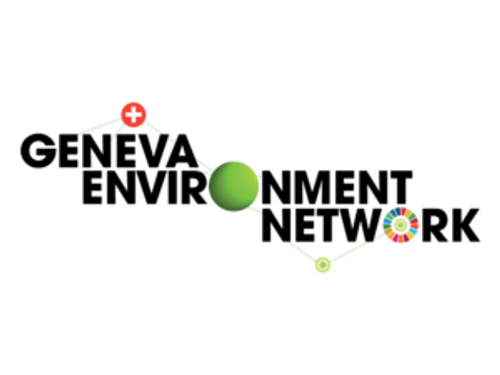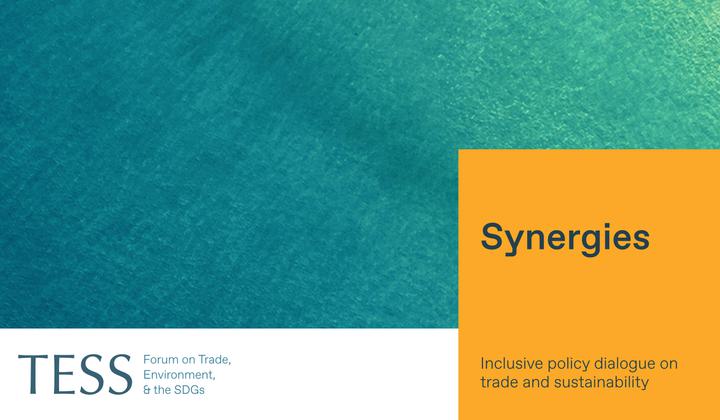At the UN Environment Assembly in March 2022, 175 governments agreed on a landmark resolution to launch negotiations on a legally binding international instrument on plastic pollution to be concluded by the end of 2024. As governments and stakeholders embark on this task, it offers a fresh focus on the overarching vision and specific goals the treaty should aim to achieve, along with the much need ambition to translate the resolution into concrete commitments and meaningful action to end plastic pollution.
In light of these, TESS, the Global Governance Centre at the Geneva Graduate Institute, and the Geneva Environment Network (GEN) co-hosted a hybrid roundtable on “Next steps for the plastic pollution treaty: Vision and priorities for commitments and action.”
The first panel of the event drew together key actors to provide an update on next steps on the plastic pollution treaty and in relation to the international fora that could complement and support the treaty process. Speakers in the second panel reviewed a sample of voluntary initiatives, standards and regulatory measures, and highlighted the specific challenges, opportunities and priorities that could be concretely addressed in the treaty. Finally, the speakers in the third panel shared views on the vision and goals that should drive the treaty talks, focused outcomes and system change needed, and how the treaty should be structured to achieve them.
The event was part of Geneva Environment Network’s Beat Plastic Pollution Dialogues, and was held in cooperation with the governments of Barbados, Ecuador, Switzerland and the United Kingdom.
Agenda
Welcome Remarks
- Carolyn Deere Birkbeck, Director, TESS
Theme 1: State of Play in Key International Processes, Next Steps, and Opportunities to Galvanise Cooperation
Speakers offered updates on the state of play on the treaty and next steps, as well as on ongoing work in other international fora that could complement and support the treaty.
Keynote Remarks
- Luis Vayas, Vice-Minister for Foreign Affairs and Cooperation, Ministry of Foreign Affairs, Ecuador
Speakers
- Leticia Carvalho, Head, Marine and Freshwater Branch, UNEP
- Rolph Payet, Executive Secretary, Secretariat of the Basel, Rotterdam and Stockholm Conventions
- Amb. Xiangchen Zhang, Deputy Director-General, WTO
- Isabelle Durant, Deputy Secretary-General, UNCTAD
Moderator
- H.E. Mr. José Valencia, Ambassador, Permanent Representative of Ecuador to the WTO
State of Play in Key International Processes, Next Steps, and Opportunities to Galvanize Cooperation
Watch the first panel of the webinar "Next Steps for the Plastic Pollution Treaty."
Theme 2: Voluntary Initiatives, Standards and Regulatory Measures: Challenges, Opportunities & Priorities
The UNEA resolution calls for the launch of negotiations for a treaty that will include both binding and voluntary approaches, based on a comprehensive approach that addresses the full life cycle of plastic. Among the objectives noted in the resolution are to “promote sustainable production and consumption” including through attention to product design, environmentally sound waste management, resource efficiency, and circular economy approaches. In addition to work on national action plans, the resolution calls on governments to find ways to “promote national and international cooperative measures to reduce plastic pollution in the marine environment, including existing plastic pollution.”
In light of this mandate, speakers in this panel:
- took stock of the landscape of industry-led supply chain efforts and partnerships, voluntary standards and labels, and domestic regulations and requirements to reduce plastic pollution;
- highlighted gaps, opportunities, and challenges, including for firms operating in and trading across many countries, for consumers and for governments;
- offered concrete suggestions on strengthening cooperation on standards and measures through the international treaty as well as the role of the Basel Convention and complementary processes such as the Informal Dialogue on Plastic Pollution and Environmentally Sustainable Plastics Trade at the WTO that aims to harness trade policies to support efforts to tackle the plastics crisis.
Speakers
- John Duncan, Global Initiative Lead, No Plastics in Nature, WWF
- Feng Wang, Coordinator, Circularity and Waste, Consumption and Production Unit, UNEP
- Kitty Parker Brooks, Associate, The Consumer Goods Forum Plastic Waste Coalition of Action
- Jean-Marc Klopfenstein, Global Master Data Lead, Nestlé SA
- Robert Beidman, Chief Product Officer, GS1
- Tiza Mafira, PR3 Indonesia
- Kristin Hughes, Managing Director, Global Plastic Action Partnership, World Economic Forum
- Justin Wilkes, Executive Director, ECOS
- Daniel Ramos, Legal Officer, WTO
Moderator
- Carolyn Deere Birkbeck, Director, TESS
Voluntary Initiatives, Standards and Regulatory Measures: Challenges, Opportunities & Priorities
Watch the second panel of the webinar "Next Steps for the Plastic Pollution Treaty."
Theme 3: Ending Plastic Pollution: Visions & Goals for a Treaty that Drives a Systemic Response
In this panel, leading stakeholders highlighted cutting-edge trends and shared their views on the vision and specific goals needed for a treaty that can drive a systemic response to pollution across the full life cycle of plastic. The discussion covered topics ranging from sustainable production and consumption to ensuring safe circularity, reducing virgin plastic production, and addressing legacy plastic pollution.
Speakers shared views on:
- their vision of an ideal system that would end plastic pollution,
- key goals, targets and outcomes that we should focus on and how to galvanise action, and
- key approaches and features of the new international treaty on plastic pollution needed to achieve these visions and goals
Speakers
- Amb. Gustavo Meza-Cuadra Velasquez, Former Minister of Foreign Affairs, Ministry of Foreign Affairs, Peru
- David Azoulay, Managing Attorney, Centre for International Environmental Law (CIEL)
- Winnie Lau, Project Director, Preventing Ocean Plastics, The Pew Charitable Trusts
- Erica Nunez, Program Officer, The Ocean Foundation
- Ben Dixon, Partner, SYSTEMIQ
- Joao Sousa, Senior Programme Officer of Marine Plastics, Global Marine and Polar Programme, IUCN – The World Conservation Union
- Carsten Wachholz, Senior Policy Manager, Ellen MacArthur Foundation
- Paolo Glerean, Chair, Recyclass
Moderator
- Felix Wertli, Head of Global Affairs Section, Swiss Federal Office for the Environment (FOEN)
Ending Plastic Pollution: Visions & Goals for a Treaty that Drives a Systemic Response
Watch the third panel of the webinar "Next Steps for the Plastic Pollution Treaty."
Reception – The Geneva Graduate Institute Cafeteria
Welcome Remarks
- Felix Wertli, Head of Global Affairs Section, Swiss Federal Office for the Environment (FOEN)
- H.E. Mr. Chad Blackman, Ambassador, Permanent Representative of the Permanent Mission of Barbados to the United Nations and other international organisations in Geneva
- H.E. Mr. Simon Manley, Ambassador, Permanent Representative of the UK to the United Nations and other international organisations in Geneva
- H.E. Mr. José Valencia, Ambassador, Permanent Representative of Ecuador to the WTO
Welcome remarks focused on the importance of cooperation across the international system on plastic pollution and the value of ‘whole of government’ approaches.
In this spirit, the reception gathered delegations, officials stakeholders working on plastic pollution through a range of international organisations and processes, focused on issues ranging from environment and chemicals to health and trade that are relevant to plastic pollution, as well as students and researchers from the Geneva Graduate Institute.






